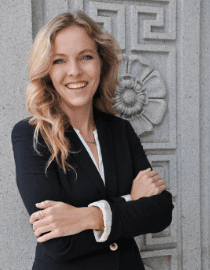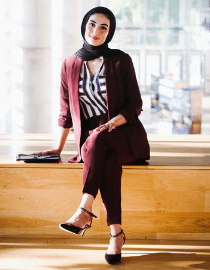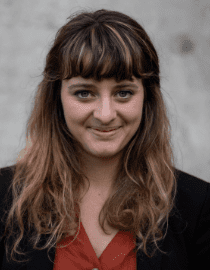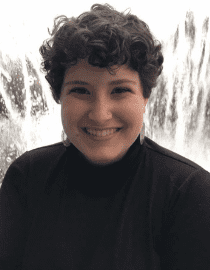By Andrew Cohen
Berkeley Law’s surging international law program got another recent boost when four standout students — Kelsey Peden ’21, Najia Humayun ’22, Christine Hulsizer ’21, and Simone Lieban Levine ’21 — were selected as Salzburg Cutler Fellows.

Coordinated through the Lloyd N. Cutler Center for the Rule of Law, the prestigious program accepts students from the nation’s top 14 law schools. It explores the future of public and private international law, enabling participants to engage with top scholars in the field, network with fellows from other schools, and present their work.
Fellows participated online rather than in-person this year due to the COVID-19 pandemic — which meant the program spanned six sessions between March 11-27 rather than a single weekend in Washington, D.C., as in previous years. They engaged with prominent legal professionals, public servants, and leaders in international law and public service.
“I came to law school knowing I wanted to pursue a career in international law,” says Peden, who had worked as an international tour guide for American teenagers. “That exposed me to the lives, cultures, and governments across the world. It also instilled this idea of unity, that the world could only address some of our biggest issues — climate change, gender discrimination, anti-immigrant rhetoric — through international collaboration.”
Other schools in this year’s program were Chicago, Columbia, Cornell, Duke, Georgetown, Harvard, Michigan, New York University, Northwestern, Penn, Stanford, Virginia, and Yale. The 53 overall students represented countries from all over the world, including Canada, China, Ghana, Mexico, Sweden, Taiwan, and Turkey.
Berkeley Law’s second student contingent was joined by Clinical Professor of Law and Clinical Program Director Laurel E. Fletcher, co-director of the school’s International Human Rights Law Clinic and co-faculty director of its Miller Institute for Global Challenges and the Law.
Selected fellowship candidates submitted paper topics, and later a full draft or eight-page executive summary for works in progress. They were then divided into discussion groups, connecting with similar regional papers or topics, under the supervision of two faculty directors.
“The international law community at Berkeley is tight-knit, hard-working, and absolutely wonderful,” Levine says. “It was an incredible experience to meet, learn from, and network with students and professors from similar communities at schools across the country. It’s a thrilling next step for my career and will likely serve a vital role in introducing me to the European legal market.”
Many possible paths
Peden notes that international law offers options for students interested in wide-ranging issues, including migrant rights, sex and gender based violence, trade laws, reproductive justice, environmental law, cross border arbitration, and international criminal law and tribunals.

Her paper focused on reforming U.S. sanctions to provide reparations for Rohingya victims in Myanmar; Hulsizer’s discussed U.S states incorporating international human rights norms; Humayun’s probed the Islamic position on capital punishment, which ties in theories of restorative justice, international law, and prison abolition; and Levine’s explored whether international abortion rights could combat U.S. abortion bans and restrictions.
“I think international law can be valuable when it doesn’t limit itself to a Western-centric point of view,” Humayun says. “International legal theory and institutions alike are fundamentally flawed in that they privilege the U.S. and European nations. Systemically changing these international institutions to be more egalitarian could make international law a useful tool to solve global problems in today’s world.”
Program speakers included Penn Law Professor Zeid Ra’ad Al Hussein, president and CEO of the International Peace Institute and former United Nations High Commissioner for Human Rights; Sue Biniaz, senior fellow for climate change at the U.N. and former lead climate lawyer for the U.S. State Department; and John B. Bellinger III, a partner at Arnold & Porter and former legal adviser to the U.S. State Department and National Security Council.
They discussed the diplomatic art of human rights advocacy and the United States’ move to rejoin the Paris Climate Agreement, among other issues.
Fellows received critiques on their student papers from faculty of the participating law schools, and advice on how to seek publication in journals. They also discussed personal ambitions and potential international law career routes with mentors from The World Bank, New Markets Lab, Rock Creek Global Advisors, the International Monetary Fund, Equality Collective, and the U.S. State Department’s Office of Human Rights & Refugees.

“My two greatest interests in law school have been public international law and California state governance, and I was so excited to combine them into a single project on domesticating international human rights law norms,” Hulsizer says. “I wrote the paper initially for a class on California constitutional law, so I appreciated the opportunity to further develop the international human rights law elements with feedback from outstanding international law scholars.”
Stellar students
Currently externing at the Conasauga Public Defender’s Office in Georgia, Humayun will intern for Bronx Defenders this summer and extern with Pangea Legal Services in the fall. She has served as co-president of Berkeley Law’s Muslim and South Asian law student associations, articles editor for the California Law Review, submissions editor for the Berkeley Journal of International Law, and external communications chair for the Women of Color Collective.
Peden, vice director of the Berkeley International Law Society, has been legal director of the school’s International Refugee Assistance Project, co-director of its Gun Violence Prevention Project, co-leader of the Hub for Equity in Administrative Representation, and director of its Anti-Trafficking Project. She also worked for the International Human Rights Law Clinic and interned as a U.N. human rights fellow in Thailand.
Hulsizer, co-editor-in-chief of the Berkeley Journal of International Law, was a summer intern with the U.N. International Residual Mechanism for Criminal Tribunals in The Hague. She also spent a summer working for the U.S. State Department’s Office of the Legal Adviser, which she will join full-time after graduating.

Levine, who will clerk for Vermont Supreme Court Justice William Cohen starting this fall, has interned with the Center for Reproductive Rights, Legal Aid at Work, Planned Parenthood Federation of America, and ACLU Reproductive Freedom Project. She was president of Berkeley’s chapter of If/When/How: Lawyering for Reproductive Justice and co-leader of four pro bono projects: the Reproductive Justice Project, International Human Rights Workshop, Hub for Equity in Administrative Representation, and Environmental Conservation Outreach.
“I’m so happy I was a Cutler Fellow this year,” Peden says. “Not only do I feel a lot more inspired with my research on Myanmar, but I feel connected to a community of people working in international law that can only help my work in the future.”
Levine, citing the insightful feedback she received on her work from a leading international reproductive rights expert and the relationships she formed with students from all over the world, calls the program “incredibly rewarding.”
Her enthusiasm was fueled by personal incentive. Levine’s maternal grandmother and her parents were Austrian Jews who fled Austria and Poland in time to survive World War II in Siberia and Uzbekistan. When a new Austrian citizenship law took effect in September that allows survivors and their descendants to apply for citizenship if they left Austria because of the Nazis, Levine “jumped at the opportunity” with her mother and sister.
“On the one hand, having Austrian (and therefore European Union) citizenship would open so many doors for me to work in public international law abroad,” she says. “And on the other, more personal hand, I feel that getting Austrian citizenship is a step towards addressing what my family went through during the war and a way for me to feel more connected to my roots and my heritage.”